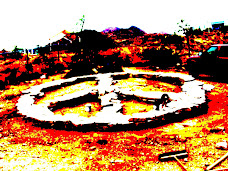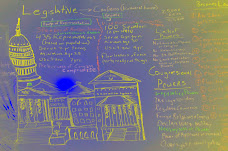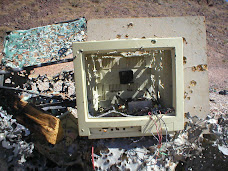What a long strange trip this has been. When I started this series I never dreamt, and the colleague who originated the survey certainly never imagined, how many people would end up having to weigh their opinions about veterans as a result of my efforts to distribute his survey. I just received a request from an anti-war group in San Diego to reprint the original survey and my original replies, and subsequently discovered the GI Rights News has reposted the whole series so far, so who knows how far this articles' impact may yet reach. And believe me readers, I am far from settled on the issue myself. I have learned far too much to conclude tidily; but now it's time to wrap it up, so let's answer some basic questions, starting with: Who all was surveyed? Well you, for example, and anyone else who has read even a couple of paragraphs in this series, or actually gone through all five previous installments, all of us have had our opinions examined, if not by me, then hopefully by yourself. And then there are the people I have interviewed or talked to on this subject these last six weeks, folks who had to come to some opinion about veterans in particular, the military as a whole, and war in general, especially the most recent wars , the ones so many current vets stake their reputation on. Judging from the strident comments posted on the various websites that ran this series (7 different sites), it seems for the most part that Americans, western Arizonans in particular, who are so quick to champion our veterans, can't say much good about the wars their heroes have fought in. No, no one wants to hate their veteran family members or friends (unless they are truly detestable and generally not even then), but far more Americans, even western Arizonans, are willing to admit they have little love for their wars. Unfortunately, however, war seems to be the kind of thing most Americans don't regret till afterward. According the most recent Gallup poll online, " seven out of 10 Americans (69%) still believe that sending troops to Vietnam was a mistake." In the 90s George H.W. Bush could not even get re-elected in the wake of our national disappointment over the Persian Gulf War and the governmental neglect of the hundreds of thousands of supposedly-cherished disabled vets who the military tried to sweep under the rug in their decades-long denial of Gulf War Syndrome. Grenada and Panama are but the butt of jokes; and our Latin American adventures are a global embarrassment. By as early as May of 2007, only about four years after the glorious start of the current quagmire, "the New York Times and CBS News' poll [showed] 61% believed the U.S. 'should have stayed out' of Iraq." CNN polls show opposition to the Iraq Occupation has been as high as 70% since then. A survey of the literature available on vets also shows a decided no-vote on the efficacy of modern American warfare, at least as for its impact on those required to practice it. The military experience once thought to season a person, often does so at what we now understand to be a terrible price. I scanned several dozens of articles and recommend the single dozen links I've attached as a bibliography at the bottom of this column . But to summarize: various articles talk about the most glaring disservice our military does to its members, the sheer number of vets who find themselves homeless--1/4 to 1/3 of all the homeless on any given night are vets. Other articles note the outlandish rates of sexual harassment in the military, the increased rates of vets likely to have drug or addiction problems, or be convicted of violent/sexually violent crimes and the long-term dehumanizing effects of military training, much less PTSD. The holy myth that time in service is good for a person's character and is the noblest way to show one's love of country is again and again shown to be less a sacred vessel and more of a sieve: it only looks solid till the truth starts seeping through. Lastly, i need to note that as I've shared the life of this column with others, I also have received many amazing testimonials of people's personal experiences with the military, some of which I would like to honor here. This past Sunday, for example, I attended the ongoing Kingman peace vigils (2nd and 4th Sundays of the month, 12:00-12:30p at the corner of Stockton Hill Rd. and Airway) which are organized by Christine Meisenheimer, a local vet. Meisenheimer was also a founder of the La Crosse, Wisconsin chapter of Ladies in Black, an international anti-war group begun by grieving war-widows and mothers of dead soldiers. But back in 1977 Meisenheimer was a personal officer, a Lt. JG, in the Air Force when she had her change of heart. "I just didn't want to be part of a killing machine anymore. No matter what you do in the military you are part of its killing machine and I just couldn't keep doing that."She wrote to the Pentagon and requested humanitarian discharge. Her request was accepted "no questions asked." Like me, Christine, joined in the Vietnam aftermath, a time when the military itself was quick to dismiss doubters, having just been immensely burned by the PR disaster that was Vietnam. The Sunday before, a car tore into the parking lot near the corner where Meisenheimer and her crowd of anti-warriors gathered, waving at traffic and hoisting signs. An angry looking older man stormed up to the crowd and demanded to know if there were any vets present. We pointed out Meisenheimer in her wheelchair, out on the front row of protesters battling the wind as she tried to raise two signs. Also on that corner was a decorated Viet vet, Bert Garcia, wearing his VFW hat. These days he won't talk too much about his time in service except to say, "As soon as I got out, I became peace activist." "OK," the angry man muttered sheepishly and left without further word. Meisenheimer and Garcia are just two of thousands of veterans and former military who organize against war. Groups such as Vietnam Veterans Against the War and Iraq Veterans Against the War are highly visible at peace protests around the country. According to a phone call to their St. Louis office, Veterans for Peace nationally boasts about 6000 activist-members, including until recently one of the most celebrated vets for peace ever, the last historian, Howard Zinn. The VFP Phoenix area contact, John Henry is also Vietnam vet. In a phone interview, I asked him why so many Americans remain in love with the idea of war, even after they have been through the experience firsthand? "God, that is the question isn't it? If we knew how to answer that one then maybe things could really change. I'd guess that like most of us, most of them, the gung-ho vets, went into the military because they had issues. Something went wrong in their lives or they wouldn't have chosen the military. At the time it seemed the best offer they were going to get and then once they have made that choice, they have to keep believing it was the right one. Keep in mind most servicemen don't do the actual fighting. They are somewhere in the military, but not the front lines. They personally hadn't experienced anything particularly traumatic, haven't seen the people dying, the devastation. They buy into the premise we are doing great things by placing our soldiers around the world, that they are the people making America's greatness. They can't put it in their mind as doing something evil. As long as we can shop at our Starbucks we don't care about what we are doing to people in other countries. So they remain that way, sit at the bar at the VFW and continue their lives and still they cannot fathom what we are doing in war. But look at this: the current Iraq War was started, we say, so we could get Saddam Hussein. Well, we got him. And to get that one person we sacrificed almost a million lives. That was for our freedom? If you must take the blood of an innocent person, much less a million people and all the wounded and the refugees, to get revenge against one person who was that nation's leader, it's a lie to say it was about our freedom." The most compelling response came from a Vietnam-era veteran I met in Phoenix at that city's 1st annual Festival for Peace back in February, activist and educator, former Marine, Ahmad Daniels. Like myself and Christine Meisenheimer, Mr. Daniels decided to leave the military while in the active service, but unlike us, Daniels made his decision in 1967 during the height of the war and while in the Marines. He faced a horrendous series of consequences for his decision of conscience. Here is his own story, as sent by email: "When the Marine Corps' General Court-Martial sentenced me to 10 years and a dishonorable discharge (DD) in 1967, I was not shaken. Perhaps at the age of 19, ten years behind bars did not seem as ominous as it would today. Or maybe I was too naive and could not fully grasp the ramifications of having to go through life with a DD. While all of this may be true to some degree, what weighed heavier was my belief the war in Viet Nam was an unjust war and my convictions would not allow me to participate in such a travesty of justice. At the time I did not know that Dr. Martin L. King, Jr. took a bold and uncompromising stand against the War in Viet Nam. And even though Dr. King was harshly criticized by other Civil Rights leaders, King was clear on how he viewed America's acts of aggression. King would go on to admit he would have temporarily suspended his pacifism during WWII because Hitler was such a tyrant. Yet, he saw no such parallel in what was unfolding in Viet Nam. Whereas Dr. King's opposition to the war had universal appeal, mine was more personal. Having been told one Sunday morning (Jan. 1967) to leave an all white church in Middleton, TN, (did I mention I was in full Marine regalia?) I begin to ponder why was I training to fight and possibly die to defend a way of life (Jim Crow) that I did not subscribe to? Surely this was no battle for Blacks who had in previous wars come back from having gallantly served in Europe only to return to the USA where many were lynched from light poles while still in uniform. My initial opposition to fighting in Viet Nam stemmed from by belief it was a "white man's" war and Blacks had no place in that battle. My discussions with other Black Marines at Camp Pendleton entailed conversations stemming from news magazines depicting tanks mounted with 50 caliber machine guns rolling down the streets of Newark and Detroit during the hot summer of 1967. A period when racial insurrections tore at the seams of America. I could not, nor could the other Black Marines, make sense of going thousands of miles to wage a fight in Viet Nam when war was raging in our own neighborhood. Thus my decision to request mast and start the chain-of-command process of speaking with the Commanding General of Camp Pendleton to ask him 'why we should go to Viet Nam?' Having started with a staff sergeant who promptly admonished myself and a dozen other Black Marines that we would be charged with mutiny if we continued on this course of action, all decided to abandon the idea. It was only a week or so later the Office of Naval Intelligence was called in and they began questioning Black Marines to determine what impact my thinking had on their following orders from Marine superiors. A short time after that L/Cpl W. Harvey and myself, PFC. G. Daniels were arrested for violating a 1940 Smith-Act which made it a crime to "counsel, urge, cause and attempt to cause insubordination and refusal of duty." Four months later Harvey and me were court-martialed and sentenced to 6 and 10 years respectively and sent to Portsmouth Naval Disciplinary Command in Portsmouth, NH. Months later, I would learn of the ACLU and a relationship would begin that involved their representing Harvey and me on appeal and bringing national and international attention to our legal lynching. Finally, after over two years of incarceration, the Court of Military Appeals reversed the findings of the trail court and both of us received back pay and honorable discharges. Am I against all wars? No. I believe raising opposition to your country's international policies takes a great deal of soul searching and can not be done easily. I was confident I was doing the right thing because my conscience was clear then and remains so to this day." I could not end on nobler words, so I won't attempt to. Thank you all for all I have learned in this process. Back to my usual comedy column next issue. --mikel weisser writes from the left coast of AZ. Some Sources Cited and/or Recommended
http://www.commondreams.org/... --2002 Opinion piece on military training and post-military violence.
http://www.jointogether.org/... --2002 Article about vet increased risk of drug or alcohol addiction.
http://pn.psychiatryonline.org/... --2008 Article about suicide rates in returning vets.
http://www.counterpunch.org/... --2006 Article by retired Marine sergeant about connection between military training and atrocities.
http://www.washingtonpost.com/... --2009 Article on increase in violence among returning vets.
http://www.associatedcontent.com/... -- 2007 Article noting that veterans are less likely to go to jail than average population, but more likely to be jailed for violent/sexually violent crime.
http://www.antiwar.com/... --2008 article on Iraq vets testifying about war crimes and atrocities.
http://en.wikipedia.org/... --Wikipedia on Sexual Harassment in the Military.
http://www.nwlc.org/... --1992 white paper on sexual harassment in the military, rates have dropped since then, but are still outlandish.
http://www.msnbc.msn.com/... --2008 news network update on newer stats on military sexual harassment.
http://www.nchv.org/... --National Coalition for Homeless Vets website.
http://www.veteransforpeace.org/ --Veterans for Peace website.
Subscribe to:
Post Comments (Atom)










No comments:
Post a Comment